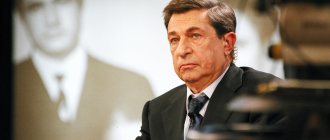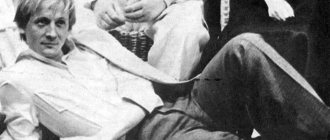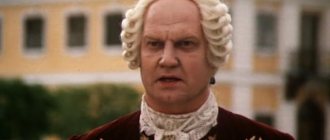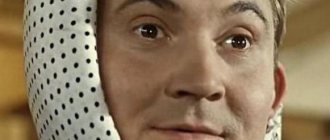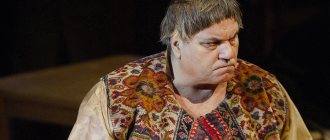Biography
Viktor Rakov is a Russian theater and film actor, and since 2003 he has been People’s Artist of Russia. Coming from a working-class family, thanks to his extraordinary talent, he managed to conquer the stage of the star Lenkom and join the ranks of the leading artists of the famous theater. TV viewers know him from his film roles in the films “The Master and Margarita”, “Loving in Russian”, “St. Petersburg Secrets”. On camera, he is able to transform into a hero of any role, from an aristocrat to a notorious villain, which is why the public loves him.
Mistress is from the evil one
| Victor RAKOV |
-Can you imagine falling madly in love?
- God forbid!
When I go to church, I pray not only for the health of my loved ones, but also to not fall in love with some young, fidgety girl. For a middle-aged man to contact a young girl is already from the evil one. — What needs to be done to attract a partner in 15 years? - Learn not to be shy. Read specialized literature, try recommended trainings. And then you can resume with redoubled force all those things that spouses usually do in the dark and under the covers. — Nastya is already big, aren’t you thinking about another child? - We think. About foster care, about patronage. It won't be possible to have one of your own - Luda has health problems. — Taking on a child is a huge responsibility. - Of course. Do you know that there are no orphanages in Armenia? When parents die, relatives take the baby. And in Russia there are thousands of refuseniks! My wife is half Armenian, a very wise woman. Now we are finishing the construction of a country house, and then together with Nastya we will go to an orphanage to choose a brother or sister for her. When there are many children in the house, it is happiness.
Childhood and youth
Viktor Rakov was born in Moscow into a working-class family. The parents of the future actor, like his older brother later, worked at the Moscow Machine-Building Plant. The only person in the family who was inclined towards the stage was his father, who loved to sing and even participated in amateur performances at the local Palace of Culture.
View this post on Instagram
A post shared by Rakov Viktor (@rakov_viktor) on Sep 5, 2020 at 10:30pm PDT
Actor Viktor Rakov
As a child, Viktor was fond of sports, practiced judo at a children's and youth sports school, and played football in the yard. But secondary school was torture for the boy. The only subject that he perceived positively was the fine arts lesson. Vitya often surprised his relatives when he dressed up in their clothes and copied his behavior, gait and gestures.
After graduating from the 10th grade in 1979, Viktor Rakov found a job for a year at the same machine-building plant where his entire family had worked for many years, and was even able to pass the exam for the third category of radio equipment and instrument installer. But a year later he decided to try to change his life and entered the famous theater university - GITIS named after Lunacharsky.
View this post on Instagram
A post shared by Rakov Viktor (@rakov_viktor) on Dec 8, 2020 at 9:02am PST
Olga Shakhparonova and Viktor Rakov in his youth
Rakov was enrolled in the acting department, his course was taught by Vladimir Andreev. After graduating from the institute, Victor immediately began his professional acting career and was accepted into the famous Lenkom troupe of Mark Zakharov. At the interview, a tall young man with an athletic build (Viktor’s height is 188 cm) showed the number “Cowboy Jokes” and a fight in the style of the Wild West. The theater institute graduate’s abilities came in handy in the production of “The Star and Death of Joaquin Murrieta,” for which the director was just recruiting the cast. Rakov still works in this team.
Childhood
On the fifth day of February 1962, a boy was born into an ordinary working-class family, who was named Vitya. His parents and older brother worked in mechanical engineering. Dad had an amazing voice, he performed at the local Palace of Culture.
The makings of an actor appeared in the boy very early. Already at the age of ten, he very skillfully portrayed his grandmother. All my family really liked it. As a schoolboy, he loved drawing. In the company of friends I was going to sign up for a boxing class. But after talking with my mother, I decided to abandon this idea. He began to practice judo, but when he became a high school student, thanks to the persuasion of his parents, he gave up the sport for the sake of the educational process.
Theater
Thanks to his excellent vocal abilities, the actor participated not only in plays, but also in musical productions and rock operas. After the leading role in Mark Zakharov’s play based on Alexander Ostrovsky’s play “The Sage,” Victor became a popular and in-demand theater actor. He performed the main roles in the rock operas “Juno and Avos”, “The Star and Death of Joaquin Murieta”, “Hoax” to the music of Alexei Rybnikov. Moreover, in the cult play “Juno and Avos” Rakov played 4 roles at once.
Alla Yuganova and Viktor Rakov - Fragments from the rock opera “Juno and Avos”
His repertoire also includes the role of Laertes in Shakespeare's Hamlet, Thomas Cromwell in The Royal Games, for which the artist received the Seagull Award in the Best Villain category, the image of a mountain troll in Henrik Ibsen's magnificent play Peer Gynt, roles in the children's plays "The Golden Key" and "Troubadour and His Friends", as well as other characters in famous plays. Recently, Rakov has been touring with the entreprise “The Innkeeper” based on the play by the Venetian playwright Carlo Goldoni.
Victor Rakov: I have never been a coward or a scoundrel
Author Lyubov Savitskaya
Updated: 08/27/2019 17:51 Published: 09/28/2005 20:07
Show business » Russian show business
Actor Viktor Rakov rarely communicates with journalists. He, like all popular artists, does not have enough time for this. Sometimes he still makes exceptions and then feeds the sharks with very entertaining stories.
0 shared
— For some reason, many actors don’t like to remember their school years. What associations do you have in this regard?
“I now take my daughter to school and remember with horror those years when I went there myself. I had to get up early in the morning, at 7 o’clock, from a warm bed and go outside, especially in the winter, when it was still dark outside. For me it was torture. I remember my grandmother fed me breakfast, and I slowly drank tea and looked out the window from which my school was visible. There, the lights were already coming on in the windows, the students were entering the classrooms, but I didn’t want to go there, although the school was only a couple of minutes walk away. I slowly chewed the pie to pass the time and avoid going to school longer, then, reluctantly, I got ready, trudged to my class and sat down at a desk by the window. I looked longingly at the windows of my house and saw my grandmother walking around the kitchen, lighting the gas burner, rearranging pots, cooking and frying something. I was tormented by melancholy and wanted to go home as quickly as possible, maybe that’s why I was inattentive in class and didn’t study very well... True, my love for drawing somehow tied me to school, I was even elected editor of the wall newspaper. — When did love for the opposite sex appear? - Oh, and even in kindergarten! I really liked one girl there. If she was sick and didn’t come to kindergarten, I was very sad, ate poorly, and didn’t sleep during “quiet hour.” The teachers noticed this and made fun of me. And when Marina appeared, I was happy, joy flowed out of me. I ran after Marinka all the time and pulled her pigtails, but she didn’t like it, and she always complained about me to the teacher. Now I often drive past our kindergarten on Mikhailov Street, and pictures from childhood life appear in my memory. The second time I fell in love with my classmate Marina Kruglikova. For some reason I was lucky in Marin in my youth. There were seven Marinas in our class, and mine was an excellent student, but in my opinion she never understood that I was not indifferent to her. I liked to look at her from the side, watch her walk, talk, laugh. I even tried to invite Marina to the cinema once, but ran into a blank wall. I could only fantasize, dream about her and draw her portraits. — I heard that you are not only an actor, but also an artist: your paintings have been shown at exhibitions. Who did you learn drawing from? — I learned to draw from my brother Sasha . He is eight years older than me and drew great, and I watched and tried to imitate him. I wasn’t good at it, but I didn’t give up on this idea and drew anything and anywhere: in the margins of school notebooks, in textbooks, I painted funny faces on everything I could. Sasha could draw a whole battle on a piece of paper: soldiers running and shooting, explosions, galloping horsemen, wounded in carts. He knew history well, and his drawings turned out great. Then he abandoned it all, took up technique, and I continued to draw. Gradually I learned to portray people and entire actions. 15 years ago I started painting in oils, I liked it, then I sculpted from plastic, painted cutting boards, went to Izmailovo to sell them - I had to recoup the costs! And in 1997, our actress Ira Serova got me hooked on ceramics, and I studied it for a year. I bought myself a special stove, 150 kilograms of clay, glaze and so on. I realized that I sculpt better than I draw. I was getting so much pleasure from a handmade product, but then I had to give it all up because the adverse consequences of my hobby became clear. It turns out that when glaze is fired, harmful substances are released that negatively affect the respiratory tract and stomach. And, in order not to poison myself and my loved ones, because my “workshop” was in the apartment, I had to stop my “ceramic” activities overnight. But I think that I will return to ceramics in the near future, only under different conditions. I really love doing things with my own hands and seeing the fruits of my labor. I remember when I was a child, my mother tried to teach me how to knit, but I got confused in the loops and threads and never learned to knit. Then I tried to embroider with beads. There’s still an unfinished product somewhere, but I’m still drawn to ceramics. I dream of returning to my favorite craft and creating from clay and glaze not just some bowls or ashtrays, but a large beautiful vase. — Have you ever tried to get into business? — You can’t try business, you have to do it, and for this you need start-up capital. One of my friends tried and tried, but it didn’t work out for him, and he wasted two apartments, but his business never took off. I don't need this kind of business. And what I make from ceramics I either give as a gift or keep for myself. My wife is already grumbling at me for giving away my works that she likes. My daughter is also delighted with my ceramic products. Business is not for me; I have enough work directly in my profession. I play in the theater, act in films, and take part in reprises. I really enjoy it and this job feeds my family. — In the film “St. Petersburg Secrets,” which brought you worldwide fame, you play the positive Chechevinsky, in the film “Love in Russian” - a cowardly opportunist, in “Nina” - a scumbag. Which character are you closer to in character? “I’m neither one, nor the other, nor the third, but still, I’m probably closer to Chechevinsky.” I won’t say that I’m positive in everything, but I’ve never been a coward or a scoundrel. Every person has flaws. Tell me, who doesn't have them? Only for some, negative character traits become the meaning of life, while others try to get rid of shortcomings. I consider myself to be the latter and consider myself a good father, son, brother, husband. - Why didn’t you, such a good person, have a relationship with your first wife? You still have a son from her. “We are both to blame for having to break up.” Apparently this is fate. But the initiator of the divorce was the wife, who told me that she had found someone else. I hardly survived this breakup, but, nevertheless, I am grateful to my ex-wife for it, because since then I have understood a lot, changed, it seems to me, for the better, and become more responsible. After the divorce, something broke in me towards women. It seemed to me that I would never marry again. But everything passes, and when Lyudmila , I realized that life goes on. She is a wonderful, faithful wife whom I love madly. — How did Lyudmila come into your life? — We met at the theater. Once Lyudmila came to the theater with a friend and at the end of the performance she gave me flowers. For some reason my heart sank pleasantly. Then she began to come to my performances alone. I always found her in the hall, and when I saw a familiar sweet face, I wanted to play better. We began a romance that had everything. I took her with me on tour because I couldn’t live without her for a minute. One day I stole it from home. He picked it up and took it to his dacha, where there was no telephone or post office. Lyudmila wanted to call her mother so that she wouldn’t worry, but she couldn’t. Of course, her loved ones were nervous, but we had a good time together, and we didn’t think about anything else. I then told her: “Consider that I stole you, like a bride is kidnapped in the Caucasus, and don’t think about anything.” We got married, and after the birth of our daughter, we got married. So we are spouses not only before the law, but also before God. Times were difficult then. I remember that in order to find Nastenka’s flannelette diapers, I had to travel halfway across Moscow. Everything disappeared from the shelves: no food, no formula, no milk for the baby could be found. In the children's kitchen, the norm for a newborn was catastrophically low, and I had to make friends with the girls from the dairy kitchen: they gave me either cottage cheese or kefir in excess of the norm. Now I remember all this with horror: God forbid, we return to the time we experienced during perestroika! — One very famous actor once told me the following phrase in an interview: “If an actor has a crazy fan or fan, then the actor has succeeded.” Are you successful in this sense? - Yes, in my life there was one such not entirely healthy auntie. She called me every day on the phone, declared her love, demanded that I divorce my wife, and threatened to commit suicide if I did not become her husband. I endured for a long time, spoke tactfully, convinced me to leave me alone, but she harassed me with her calls even at night and drove me crazy. I remember one day I said a bunch of nasty things to her on the phone, cursed her and demanded that she not call again. And this is what our last conversation was like. Auntie: “So I realized that you don’t love me.” Me: “Well, finally!” Auntie: “I decided to kill you. I’ll buy a gun, come to the performance and shoot you several times, so that I know for sure that you are no longer there.” - Did she really shoot? - Well, you see, I'm alive. Apparently, that woman ended up in a hospital after a seasonal exacerbation of her mental illness. Thank God, there have been no calls from her for quite some time. - Why didn’t you contact the police? - Which police? What are you speaking about? No one needs us, no one can protect us. I contacted the police, they came to her address, and then she called me and mocked me: “Did you send the police on me? So what? We've arrived. We chatted with them and they left. Ha-ha-ha!” This is the conversation. I already wanted to go to her house myself, cut all the wires so that she wouldn’t bother me anymore. And do you know who it is? She worked as a cleaner in our theater. Then she left for another job and took with her a phone book where the phone numbers of theater actors were written down. Why this telephone terrorist chose me, I have no idea.
- I see you smoke a lot. How do you fight a bad habit? — I tried, but it doesn’t work. I started smoking as a child. Now I smoke a pack of cigarettes a day. My wife also smokes, but we try not to smoke in the room: we go out onto the balcony or onto the staircase and smoke together. I believe that if you have been smoking for more than 20 years, there is no point in quitting. - How are things going with alcohol? I heard that you almost lost your seat in the theater after going on stage drunk one day?
“Once at the institute I heard the following phrase: “If an artist does not drink, he is a bad artist.” And in Lenkom I once had a sore throat, I was advised to drink 50 grams of cognac. I drank during a rehearsal, and someone reported to Mark Zakharov. He called me in and made me understand that on stage an artist must always be sober as a glass. I had to convince my director that I was not drunk at all at the rehearsal, but had taken a medicinal dose. He believed me, and such an incident never happened to me again. In our theater, discipline is very strict. In other theaters, a drunk actor is the norm. In Lenkom it is a disaster. A drunken actor walks straight off the stage from the theater forever. — You are now in excellent athletic shape. When I was a child I practiced judo. Was this necessary for self-defense or just a hobby? - Yes, like all the boys my age, I wanted to master the techniques of oriental wrestling. It was some kind of sports boom. I tried boxing, but my mother wouldn’t let me because I had a concussion and she was afraid for my head. All the boys wanted to learn karate, but this type of wrestling was prohibited, but they were allowed to practice judo. The boys and I often visited cinemas where they showed films with martial arts. We memorized the technique of strikes, then demonstrated them on each other, practiced all sorts of positions and stances of the wrestler. Brochures on karate and judo were passed from hand to hand, redrawn, memorized... In general, young people were obsessed with this. Only the judo section was officially allowed, and I signed up for it. I remember we had a coach named Leopold, and in addition to judo, he slowly showed us karate techniques, but he always warned us that using these techniques was prohibited, because you could kill a person. —Have your techniques ever come in handy in life? - No, I didn’t like to fight. Judo is not a fight, it is a wrestling match, which is very different from a street fight. I can’t boast of participating in street fights, but my skills came in handy in the filming of some films. And I pumped up my body, muscles like iron, and I still maintain that shape. When I entered the theater, I thought: if I don’t become an actor, then I’ll go to the stage movement department and be a teacher there. Fortunately, I ended up in a theater where they play, dance, and sing. It seems to me that I ended up in Lenkom thanks to my ability to move on stage, use karate, judo techniques and good vocal abilities. — Why did you choose the theater, because as a child you seemed to like clownery? - This is true. My grandfather once said: “You should be a clown, Vitya,” and advised you to enter a circus school. As a child, I was restless, I liked to play pranks on everyone, make faces, dress up in the most incredible costumes. Imagine: all my relatives are sitting at the table, having lunch. Suddenly the door opens and an old woman in a white headscarf, glasses, hunchbacked, enters the room without knocking, tapping her hockey stick on the floor. At first everyone is stunned by surprise, and then, when they recognize me, they start laughing. I was still small then, about ten years old, but I really liked to impersonate someone, so as to make everyone laugh. Then I didn’t understand that these were my first acting auditions. I tried myself not only in theater arts, but also in vocals. I really wanted to learn to sing. At the age of 15 I tried to sing “Belovezhskaya Pushcha”. I especially tried to pull out the chorus, although I didn’t understand how it should be sung at all, I had no idea that falsetto existed - I just wanted to sing. True, I still became a dramatic actor and, I think, for good reason. Milena Florinskaya
Discuss
Movies
Victor made his film debut in 1983 in the film “The Oath Record” in the cameo role of Gavrila. Then there were episodes in the children's film “Strong Personality from 2 “A”” and the romantic comedy “Accelerator”. People started talking about Rakov as a good film actor after the release of the film “Kill the Dragon” based on the play “Dragon” by Evgeniy Schwartz. The artist played the role of the son of the burgomaster Henry, performed all the stunts himself and received very high marks from specialists.
Alexander Abdulov, Viktor Rakov and Anna Frolovtseva (still from the film “Kill the Dragon”)
The next significant role on the screen was the image of Pavel Vlasov in the film adaptation of Maxim Gorky’s novel “Mother”. The actor liked the collaboration with director Gleb Panfilov so much that Rakov starred in two more of his films. In 2003, Victor was awarded the title of People's Artist of Russia. He has also been a member of the Union of Theater Workers since 1989 and a member of the Union of Cinematographers since 1990.
Viktor Rakov excels in roles in film adaptations of famous books, so it is not surprising that director Yuri Kara invited him to take the place of the Master from Bulgakov’s famous novel “The Master and Margarita”. The actor’s popularity was cemented by the television series “St. Petersburg Secrets,” based on the novel “Petersburg Slums” by Vsevolod Krestovsky, in which Rakov plays Prince Chechevinsky.
Viktor Rakov as the Master (still from the film “The Master and Margarita”)
After this, his filmography began to include a number of interesting roles in the films “Love in Russian”, “Barkhanov and His Bodyguard” and the TV series “Detectives”, “Kamenskaya”, “Satisfaction”, “Dasha Vasilyeva”, “Wolf Messing: Who Seen Through time". In 2005, the actor played the role of Lunin in the 6th season of the detective series “Deadly Force”, and also played the main role of an FSB captain in the series “Nine Unknowns”.
In 2006, Victor played 4 main roles: in the film “Krom”, the Russian-Ukrainian comedy detective “It’s Better Not to Know About This”, the action film “Main Caliber” and the melodrama “Another One’s Own Sister”. In 2007, the actor presented the historian Rogachev in the drama “Oranienbaum. Silver Samurai”, which shows parallel storylines from the times of Peter III and modern times. In 2009, Rakov played leading roles in the comedy “Double Loss” and the melodrama “Miracles Don’t Happen.”
Victor Rakov (still from the film “Oranienbaum. Silver Samurai”)
In 2011, the actor appeared in the melodrama “Porcelain Wedding.” Rakov played the head of the neurosurgery department, Oleg Maksimov, whose wife found out that her husband was leading a double life, just before their 20th wedding anniversary. In 2013, Victor played the role of haberdasher Bonacieux in Sergei Zhigunov’s film “The Three Musketeers”. In the same year, the actor received a Russian state award - the Order of Friendship.
In 2014, Rakov played the role of MGB Major Polishchuk in the Russian-Ukrainian family saga “The House with Lilies” about the events that unfold immediately after the Great Patriotic War and continue to this day, connected with a house with a curse. In the same year, the actor appeared in the film performance of the Lenkom Theater “Heavenly Wanderers”. The drama is based on the works of Aristophanes and Anton Pavlovich Chekhov, but is not a strict adaptation, but is positioned as a stage fantasy by director Mark Zakharov.
Victor Rakov (still from the series “House with Lilies”)
At the beginning of 2020, the actor appeared on television in the leading role of district police officer Nikolai Belozer in the mystical detective series “The Alchemist. Elixir of Faust. In November 2015, Rakov appeared as Alexei Grigorievich Razumovsky, the favorite of Empress Elizabeth Petrovna, in the drama “The Great” about the youth and court intrigues of Princess Sofia Frederica, the future Catherine the Great.
In the same year, Victor plays Senor Balboa in the film-play “White Lies” based on the play “Trees Die While Standing” by A. Casona. The actor's character is a grandfather whose only grandson became a scoundrel and disappeared. To reassure his wife, Senor Balboa writes letters to her on behalf of his grandson, in which the young man improved and began to prosper. The deception is gaining momentum, forcing the venerable lord to hire actors and falsify facts.
Viktor Rakov and Inna Churikova (still from the film “White Lies”)
One of Viktor Viktorovich’s latest film works is a supporting role in the melodrama “Blue Rose,” which television viewers saw in 2017. In the television film, the artist played the role of a friend of the main character, Alexander Korotkevich (Nikolai Fomenko). On the big screen, Rakov appeared in the cast of the drama “In the Port of Cape Town,” which premiered in August 2018 as part of the Window to Europe film festival. Evgeny Tkachuk, Vladimir Steklov, Alexander Robak, Yuri Kuznetsov, Yulia Aug and others also took part in the creation of the film.
Creativity[ | ]
Theater roles[ | ]
- Sage A. N. Ostrovsky, - Glumov
- The Star and Death of Joaquin Murrieta - Joaquin Murrieta, Presenter and Customs Officer, Organ Grinder
- Hamlet - Laertes
- Juno and Avos - Fernando Lopez, Theater Man, Burning Heretic, Count Rezanov
- King's Games - Thomas Cromwell
- Jester Balakirev - Menshikov Alexander Danilovich
- Va-Bank - Dulchin Vadim Grigorievich
- Marriage - Podkolesin
- Peer Gynt - Grandfather of Davor, King of the Trolls
- White Lies - Señor Balboa, Grandfather
. director Gleb Panfilov. (2012) - Heavenly Wanderers - Ryabovsky
Filmography[ | ]
- 1983 — — Gavrila
- 1984 — — construction worker
- 1985 — — Petrakov
- 1987 - Accelerator - Pavel
- 1988 - Kill the Dragon - Heinrich
- 1989 - Was there Carotene? — Friedrich Werman
- 1989 — — Sergey Troitsky
- 1989 - Mother - Pavel Vlasov
- 1990 - Humiliated and Insulted - Alyosha Valkovsky
- 1991 — — Demon
- 1991 — — doctor
- 1991 - Kremlin secrets of the sixteenth century - young sorcerer
- 1992 — — grandson of Molokanov
- 1992 - Midshipmen III - Baron Brockdorff
- 1993 — — Oleg
- 1993 — — Dmitry Pavlovich Lebedev
- 1994 - The Master and Margarita - Master
- 1994 - St. Petersburg secrets - Prince Nikolai Chechevinsky / Count Kallash
- 1995 - Love in Russian - Mikhail
- 1996 - Barkhanov and his bodyguard - Alyabyev
- 1998 — — Rumble
- 1999 - Love in Russian-3. Governor - Mikhail
- 1998 - Denouement of the St. Petersburg Mysteries - Prince Nikolai Chechevinsky
- 2000 — — loaf
- 2000 — — Artyom Sapega
- 2001 — — Bobrovsky
- 2001 — — Darling
- 2001 - Salome - Ratsky
- 2001 - 2005 - Detectives - Poloskaev (series “The Vanished Adonis”, “Passion”, “Repentant Sinners”)
- 2002 — — director
- 2002 - Next 2 - Kirsanov
- 2002 — — Vladimir Krokhmal
- 2003 - Boulevard Binding - Lavochkin
- 2003 — — Shitov
- 2003 - Kamenskaya 3 - Alexander Volokhov
- 2003 — — doctor
- 2003 — — Max
- 2003 — — Paul
- 2004 - December 32 - Vadim
- 2004 — — Korzinkin
- 2004 — — Tikhon
- 2004 - Russian - Mikhailov, patient from the “quiet” ward
- 2004 — — Ilya Kazarnovsky
- 2005 - Nine unknowns - Scarabs
- 2005 - Star of the era - Papa Vasya
- 2005 - Satisfaction - Raevsky
- 2006 - Lethal force-6 - Lunin
- 2006 — — Tikhon
- 2006 - Alive - philosopher
- 2006 — — Anton, media tycoon
- 2006 — — Alexey Sokolov
- 2007 — — Stoletov
- 2007 - / Zvezda Imperii
-
Grand Duke Sergei Mikhailovich - 2007 - Trap - Kostya
- 2007 - Listening to silence - Robert (son of Altaeva)
- 2007 — — Mitrofanov
- 2007 - Detective Putilin - Yakov Kukolev, merchant
- 2008 — — Stepan Stormin
- 2008 — — electrician Koloukhov
- 2008 — — Reztsov
- 2008 — — Pyotr Gurov
- 2008 — — Stepan
- 2008 - Silver Samurai - historian Rogachev
- 2008 — — killer
- 2009 - Wolf Messing - Baron Heinrich Canaris
- 2009 — — Surin, NKVD major
- 2009 - Motley Twilight - son
- 2009 - Admiral - investigator Popov
- 2009 — — Gosha
- 2009 - Zhurov - Anatoly Karpov, director of the boarding house
- 2010 — — Fyodor Kerensky, architect
- 2010 — — Masha's ex-husband
- 2010 — — Mezetsky
- 2010 — — Mikhail Dostoevsky
- 2011 - Raider - Sergei Mikhailovich Kolesov, head of security
- 2011 — — priest
- 2011 — — Oleg Viktorovich Maksimov, doctor
- 2011 — — scout Pike
- 2012 - Once in Rostov - Vladimir Tolstopyatov, projectionist of the Rostov cinema "October", Vyacheslav's older brother, member of the Rostov gang "Fantomas"
- 2013 - The Three Musketeers - Bonacieux
- 2014 - House with lilies - Miron Polishchuk
- 2015 — — Nikolai Pavlovich Belozer, KGB captain, investigator of the district police department
- 2015 - Great - Count Alexey Grigorievich Razumovsky, favorite of Elizabeth Petrovna
- 2019 — Tobol
Voiceover[ | ]
- 1992 — — Nikolai Bauman
(role of Alexei Bogdanovich) - 2000 - The Romanovs. Crowned family - Emperor Nicholas II
(role of Alexander Galibin) - 2008 - Largo Winch: The Beginning - Largo Winch
- 2009 - Like a tough security guard - Detective Harrison
- 2009 - Roll! — Razor
- 2010 - In the style of Jazz - Sergei
(role of Mikhail Zhebrovsky) - 2011 - Largo Winch: Conspiracy in Burma - Largo Winch
From 2009 to 2020, he also voiced announcements on the TV Center channel.
Songs[ | ]
- "Where are you?" (music by Pavel Usanov, lyrics)
- “Roads” from the t/s “Petersburg Secrets”
(music by Andrei Petrov, lyrics by Marina Tsvetaeva) - “Cranes” (music by Ian Frenkel, lyrics by Rasul Gamzatov)
- “It seemed to me” (music by Nikolai Parfenyuk, lyrics by Viktor Rakov)
- “Man and Woman” (music by Ekaterina Semyonova, lyrics by Mikhail Mishin)
- “Island of Rains” (music by Irina Belova, lyrics), duet with Alla Yuganova[3]
- “The stars came down from heaven...” (music and lyrics), duet with Elena Stepanova[9][10][11]
- “It’s time to hit the road” (music by Vasily Solovyov-Sedoy, lyrics by Solomon Fogelson)
- “The Last Battle” (music and lyrics by Mikhail Nozhkin)
- “Romance of Raevsky” from the t/s “Satisfaction”
(music by Igor Kamensky, lyrics by Yuri Ryashentsev)[12] - “That’s what love is” (music by Roman Mayorov, lyrics by Mikhail Ryabinin), duet with Elena Stepanova
Personal life
The actor married twice, Rakov has two natural children and one adopted. Victor entered into his first marriage when he was a student at GITIS. The future actor married classmate Olga Ilyukhina. They had a son, Boris. This union lasted 5 years, after which Olga left her husband for another man. The artist was going through a breakup with his first wife and, according to him, became a tougher and more cynical person towards the opposite sex. Subsequently, he was afraid of a serious relationship for a long time.
View this post on Instagram
A post shared by Rakov Viktor (@rakov_viktor) on Jan 1, 2020 at 2:23am PST
Victor Rakov with his wife Lyudmila and brother Alexander
The actor’s heart was melted by a girl named Lyudmila. She became Victor's second wife. The future spouses met at Rakov’s performance at the Lenkom Theater. The young people talked backstage in a friendly company, after which they began dating. At first, Victor and Lyudmila lived in a civil marriage, but before the birth of their daughter Anastasia in 1992, they officially signed and got married in church. In 2009, the actor and his wife adopted a boy, Danila, and are raising the child as their own son.
View this post on Instagram
A post shared by Rakov Viktor (@rakov_viktor) on Feb 4, 2020 at 11:15pm PST
Victor Rakov with his family
According to the artist, after his daughter grew up, he and his wife decided to become parents again, especially since they still felt young. The child turned out to be very artistic and sociable. Now Danila attends a music school and practices water polo. Victor assumes that the boy will choose the profession of an actor in the future.
The Rakovs’ daughter Anastasia is fond of capoeira, and chose the production department of GITIS as her higher education. While studying at the university, the girl managed to get married. The artist hopes that his daughter’s personal life will turn out happily, although at first he was not delighted with Nastya’s choice.
“The Fate of Man” - Viktor Rakov
Viktor Viktorovich spoke about the events of his family life on the air of Boris Korchevnikov’s author’s program “The Fate of a Man.” TV viewers saw the release of the program at the beginning of 2019. During the conversation, the actor mentioned that, as a first-year student, he courted Elena Yakovleva, who was also studying at GITIS at that time.
In his free time, Rakov paints; the actor’s paintings have been exhibited at the Bakhrushin Museum in Moscow and the Ermolova House Museum. The artist has his own workshop where he sculpts from clay. He was introduced to ceramics by his colleague Irina Serova, with whom Viktor Viktorovich subsequently organized joint exhibitions. In many films with Rakov’s participation, viewers hear songs performed by him. These are mainly romances or soulful ballads.
Interesting Facts
- The artist’s height is 188 cm.
- He is a believer.
- He likes to paint in his free time. The actor exhibits his works at the Ermolova House-Museum and the Bakhrushin Museum in Moscow.
- He has his own workshop where he sculpts from clay. He is also interested in ceramics and organizes his own exhibitions.
- From time to time, Victor takes part in various television programs, including “The Fate of a Man” by Boris Korchevnikov (2019).
- In films, Victor often performs various ballads and romances.
Victor Rakov now
In August 2018, with the participation of Viktor Rakov, filming of the project “Abode” began, based on the novel of the same name by Zakhar Prilepin, published in 2014. The producer of the film was Valery Todorovsky, the director was Alexander Veledinsky. Together with the Lenkom star, Konstantin Khabensky, Andrey Chadov, and Sergei Bezrukov will appear on the screen.
View this post on Instagram
A post shared by Rakov Viktor (@rakov_viktor) on Mar 25, 2020 at 6:11am PDT
Victor Rakov in 2020
The film will focus on a special-purpose camp located on Solovki. The artist announced the start of the filming process from his personal Instagram page, where he posted photos and videos of the first days of the work process.
In 2020, an 8-episode film “Tobol” about the development of Siberia was released, the genre of which the creators, by analogy with Westerns - films about the exploration of the Wild West - designated as Eastern. The plot of the film takes place in the times of Peter the Great and shows the life of famous personalities: the educator Semyon Remezov and Prince Matvey Petrovich Gagarin, the first Siberian governor. One of the main roles in the film was played by Viktor Rakov.
Master, Nikolai Chechevinsky and others...
Viktor Rakov, whose films enjoy the well-deserved sympathy of viewers of different ages, came to cinema back in 1983. It was a small role in the TV movie “The Oath Record.” And only after five long years, Mark Zakharov invited him to a serious, big role in his film “Kill the Dragon.” Then there was work with Gleb Panfilov in the film “Mother” (the role of Pavel Vlasov).
View gallery
The year 1994 came, when the decision was made to make a new film adaptation of Bulgakov’s acclaimed novel “The Master and Margarita.” Yuri Kara, who directed the film, invited the actor to play the role of the Master. Unfortunately, all the footage somehow inexplicably disappeared for ten years. That's why viewers saw the series after a long time.





